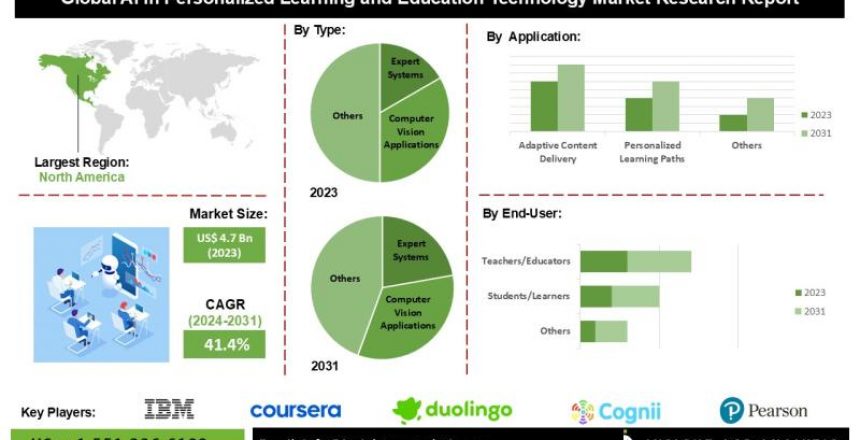InsightAce Analytic Pvt. Ltd. announces the release of a market assessment report on the “Global AI in Personalized Learning and Education Technology Market – (By Type (Machine Learning Algorithms, Natural Language Processing (NLP) Systems, Expert Systems, Computer Vision Applications, Intelligent Tutoring Systems (ITS), Virtual Learning Environments (VLEs), Adaptive Learning Platforms), By Application (Adaptive Content Delivery, Personalized Learning Paths, Individualized Assessment and Feedback, Intelligent Content Creation, Smart Content Recommendations, Personalized Learning Analytics, Student Progress Monitoring), By Educational Level (K-12 Education, Higher Education (Colleges and Universities), Corporate Training and Professional Development, Language Learning, Skill-based Learning), By End-User (Students/Learners, Teachers/Educators, Administrators/Schools and Institutions, Corporations and Enterprises, Language Learning Institutions)), Trends, Industry Competition Analysis, Revenue and Forecast To 2034.”
According to the latest research by InsightAce Analytic, the Global AI in Personalized Learning and Education Technology Market is valued at USD 6.5 Bn in 2024, and it is expected to reach USD 208.2 Bn by the year 2034, with a CAGR of 41.4% during the forecast period of 2025-2034.
Artificial Intelligence (AI) is increasingly being integrated into personalized learning and educational technology, driving a transformative shift in traditional teaching methodologies. AI-powered personalized learning leverages data-driven algorithms to evaluate various aspects of student performance, learning preferences, and progression, enabling the creation of customized curricula and targeted interventions. This approach allows educators to develop adaptive learning pathways that align with each student’s unique strengths and areas for improvement, fostering a more engaging and effective educational experience.
Effective learner segmentation is critical to the successful deployment of AI in personalized education. By classifying students based on attributes such as learning styles, academic performance, and areas of interest, educators can deliver tailored content and interventions that address specific learning needs. This individualized approach enhances engagement and supports deeper comprehension of complex concepts, thereby contributing to improved learning outcomes.


